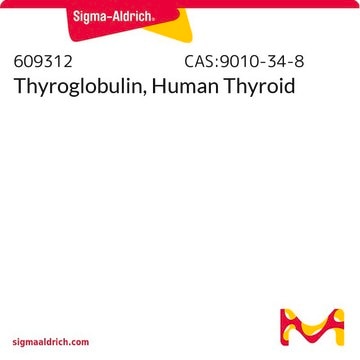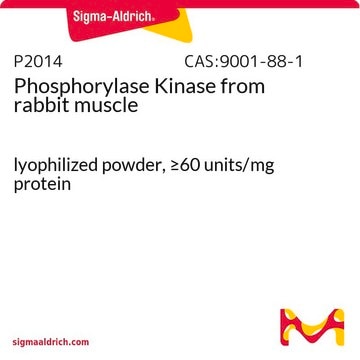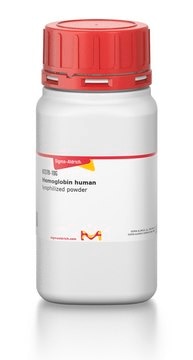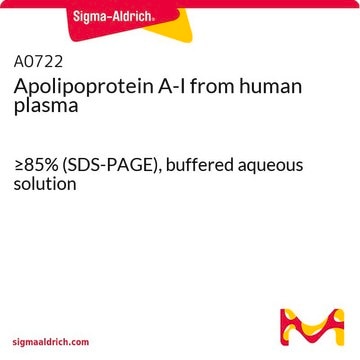S3644
Spectrin from human erythrocytes
buffered aqueous glycerol solution
Sign Into View Organizational & Contract Pricing
All Photos(1)
About This Item
Recommended Products
biological source
human erythrocytes
Quality Level
form
buffered aqueous glycerol solution
UniProt accession no.
application(s)
cell analysis
shipped in
wet ice
storage temp.
−20°C
Gene Information
human ... SPTA1(6708)
Related Categories
General description
Spectrin is the major component of the protein network, which covers the cytoplasmic surface of vertebrate erythrocyte membranes. It is a high molecular weight heterodimer composed of two subunits (molecular weights of approximately 230 kDa and 250 kDa). Spectrins are extended flexible molecules approximately 200-260 nm in length and 3-6 nm across with actin-binding domains at each end. Spectrins are composed of α and β subunits, which are both related to a-actinin. The α and β subunits associate laterally to form antiparallel heterodimers and the heterodimers are assembled head-head to form heterotetramers. The erythrocyte membrane skeleton is organized as a polygonal network formed by five to seven extended spectrin molecules linked to short actin filaments approximately 40 nm in length. The spectrin-actin network of erythrocytes is coupled to the membrane bilayer primarily through the association of spectrin with ankyrin, which in turn is bound to the cytoplasmic domain of the anion exchanger. A major function of the spectrin skeleton in erythrocytes is to provide mechanical support for the membrane bilayer and allow survival of the cells in circulation.
The C-terminus of spectrin contains a calmodulin-like EF domain. This domain is critical for binding of spectrin to actin for proper cytoskeletal formation. Deletion of this domain results in weak, irregularly-shaped red blood cells.
Quality
Highly purified
Physical form
Solution in 50% glycerol containing 100 mM sodium chloride, 10 mM phosphate buffer, pH 8.0, 1 mM dithiothreitol, 1mM EDTA and 0.1 mM phenylmethylsulfonyl fluoride.
Disclaimer
RESEARCH USE ONLY. This product is regulated in France when intended to be used for scientific purposes, including for import and export activities (Article L 1211-1 paragraph 2 of the Public Health Code). The purchaser (i.e. enduser) is required to obtain an import authorization from the France Ministry of Research referred in the Article L1245-5-1 II. of Public Health Code. By ordering this product, you are confirming that you have obtained the proper import authorization.
wgk_germany
WGK 1
flash_point_f
Not applicable
flash_point_c
Not applicable
Certificates of Analysis (COA)
Search for Certificates of Analysis (COA) by entering the products Lot/Batch Number. Lot and Batch Numbers can be found on a product’s label following the words ‘Lot’ or ‘Batch’.
Already Own This Product?
Find documentation for the products that you have recently purchased in the Document Library.
Peter Bellstedt et al.
Journal of biomolecular NMR, 54(4), 325-335 (2012-11-28)
We have carried out chemical shift correlation experiments with symmetry-based mixing sequences at high MAS frequencies and examined different strategies to simultaneously acquire 3D correlation spectra that are commonly required in the structural studies of proteins. The potential of numerically
Alessandro Borgia et al.
Nature communications, 3, 1195-1195 (2012-11-15)
Theory, simulations and experimental results have suggested an important role of internal friction in the kinetics of protein folding. Recent experiments on spectrin domains provided the first evidence for a pronounced contribution of internal friction in proteins that fold on
Pan Zhang et al.
Nucleic acids research, 41(10), 5321-5340 (2013-04-11)
Telomere integrity is critical for telomere function and genomic stability. We previously demonstrated that non-erythroid α-spectrin (αIISp) is present in mammalian cell nuclei where it is important in repair of DNA interstrand cross-links (ICLs) and chromosome stability. We now demonstrate
Laura Picas et al.
ACS nano, 7(2), 1054-1063 (2013-01-26)
The erythrocyte membrane, a metabolically regulated active structure that comprises lipid molecules, junctional complexes, and the spectrin network, enables the cell to undergo large passive deformations when passing through the microvascular system. Here we use atomic force microscopy (AFM) imaging
Matthew D Vesely et al.
Annals of the New York Academy of Sciences, 1284, 1-5 (2013-05-09)
Accumulated data from animal models and human cancer patients strongly support the concept that the immune system can identify and control nascent tumor cells in a process called cancer immunosurveillance. In addition, the immune system can also promote tumor progression
Our team of scientists has experience in all areas of research including Life Science, Material Science, Chemical Synthesis, Chromatography, Analytical and many others.
Contact Technical Service





